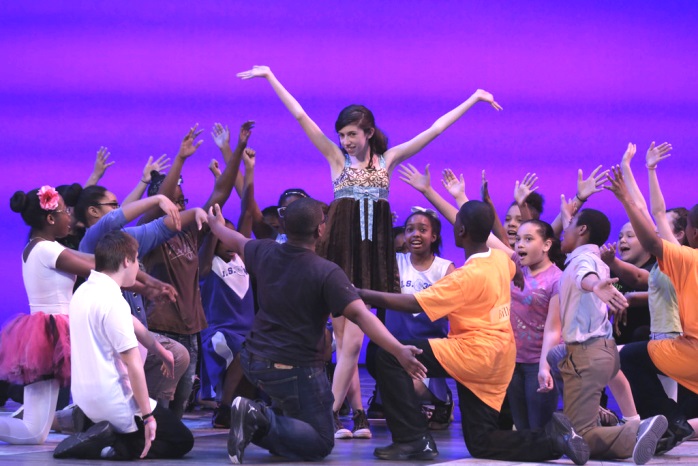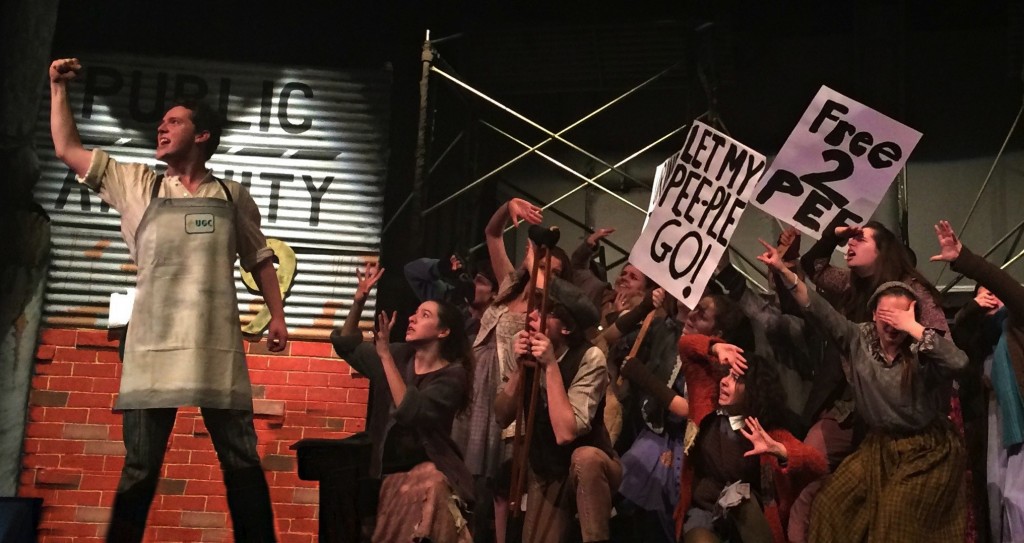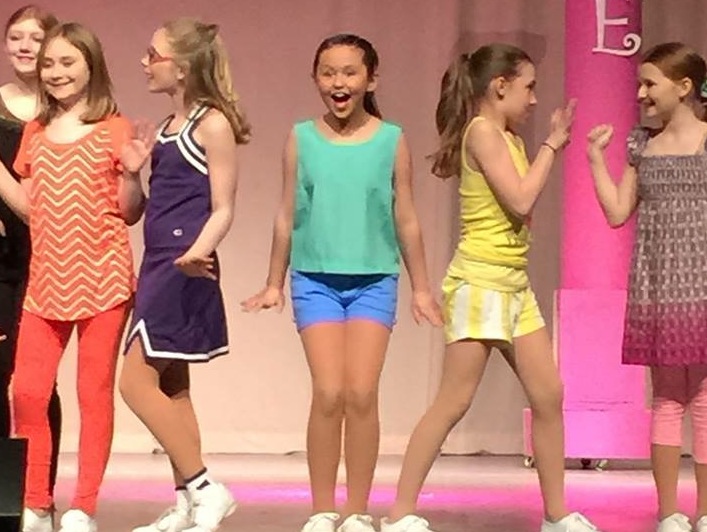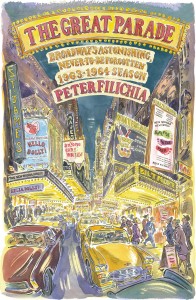Filichia Features: My Own Version of March Madness
Filichia Features: My Own Version of March Madness
 It was “The Road to the Final Four,” as CBS Sports trumpeted all month long. The National Collegiate Athletic Association’s College Basketball Tournament – more chummily known as “March Madness” -- once again dominated the late winter sports news.
It was “The Road to the Final Four,” as CBS Sports trumpeted all month long. The National Collegiate Athletic Association’s College Basketball Tournament – more chummily known as “March Madness” -- once again dominated the late winter sports news.
Fine, and good luck to Duke, Kentucky, Michigan State and Wisconsin. I saw none of their victories because I was busy with my own version of March Madness -- a theatrical one.
As a result, I too had “The Road to the Final Four” performances of a quartet of musicals, all of which were remarkable.
First came Disney's High School Musical, Jr. in New York City, thanks to ArtsConnection and P94M The Spectrum School.
Spectrum is an acronym for Special Populations Educated Creatively through Rigor, Understanding and Motivation. It’s often been said that the hardest fear most people cannot conquer is getting up in front of people. Look how many of these special needs kids did it. Even the ones who didn’t do each and every gesture caught up and did most of the rest of them.
Yes, as with any other student production, there was an occasional mistake. And yet, the kids have learned one of theater’s most valuable lessons: if you make a mistake, forget about it and just go on. They indeed did. But the looks of relief on their faces when they got through a number without a mistake were palpable. The show’s “We’re All in This Together” was a perfect theme song for the teamwork they showed.
The students clearly felt empowered just from holding microphones in their hands. Tyler S. (the program only offers the initials of last names) loved the authority of playing Coach Bolton. Theater teacher and director Nina Berke started out mouthing the words along with them, but soon stopped when she saw they didn’t need her; she spent the rest of the hour beaming at every victory. So did Tessa Derfner, the coordinator for arts instruction who started the program. Musical director Scott Evan Davis took cell phone photos so he could remember each achievement and achiever. The kids didn’t disappoint him; after each number, their smiles seeped through as if to say “Can you believe I did this?!” They knew they accomplished so much even before the delighted audience gave what lyricist Lee Adams called “the sound that says love” – meaning “applause.”
New Jersey played host to the other three productions. At Westfield High School, Urinetown had a more ornate set than it did on Broadway: two levels, with dozens of kids looking like the Wrath of God, down to eyepatches and crutches. This isn’t a musical that relies on pretty or leggy chorus girls or handsome leading men. If you’ve got a surfeit of character actors, here’s the show for you.
Of course you still have to be able to do it well, and Daniel Devlin, one of the finest stage directors in secondary education, made his cast appear to be the cast of WORKING gone demented, clutching their clothes in agony because, as the song goes, “It’s a privilege to pee.” People who visit Jersey thrift shops will have an easier time finding good clothes now that Devlin’s crew found the worst ones.

Year after year, Devlin has so many talented kids that he must find a show to house them all. Urinetown could only afford 16 on Broadway, but Devlin had 49 – making Caldwell B. Cladwell (the superb Frank Guerriero) seem all that more successful, given how many, many employees he had. There were plenty more cops, too, which upped the fascism quotient (although Samantha Hahn made them seem less ominous and odious by having them do a Keystone Kops-like tap dance).
Devlin knows that no matter what the role, the performer playing it must mine its depths. So Julian Mazzola, portraying second-banana cop Barrel, showed moony-eyed hero-worship for top-dog cop Lockstock (the estimable Michael Poyntz).
Meanwhile, 11 miles away at Woodbridge High School, director Tom Lynch has a tougher time of it. “We’re a blue collar school with very limited resources,” he says. “We get not one cent from the Board of Education or the school. I can only put on a musical if I make enough money from last year’s show to fund this one.
“I decided on BRING IT ON – the musical about cheerleaders -- mostly because of last year’s In the Heights. I’d previously varied between classics such as Cabaret and newer material such as 13, and always got the same audience – the ‘good’ kids already interested in theater, their friends and parents.
“But with In the Heights, roughly 50% who auditioned had never crossed the threshold of the drama room. The show’s hip-hop, ethnic, street quality brought in a different kind of student and made for a different mix in the cast. At performances, hundreds of non-theater, non-academic kids came to see it.
“Yes, there was more talking, more texting, more leaving their seats – and more crying babies who never should have been there in the first place. But I’ll grab any chance to introduce musicals to people who don’t know their magic. Because our school is roughly one- third Hispanic, one-third black, and one- third white, it seemed to me that BRING IT ON’s plotline would speak to the kids.”
Indeed. Campbell is a cheerleading captain for Truman, a middle-class suburban high school – until redistricting sends her to Jackson, an urban high school that has no interest in cheerleading.
That’s for good reason. Danielle and the other inner-city kids must work after school if they’re going to go to college. Their parents simply aren’t able to pay a tenth of tuition. How Campbell tries to convince Danielle to cheerlead – and how she wound up at Jackson in the first place – are only two of the hard-hitting surprises in the 2013 Tony-nominated musical.
Lynch said he worried “that nobody but cheerleaders would come to see it,” but that wasn’t the case. There are Broadways shows that wish they had such attendance. Theatergoers laughed at “If a school doesn’t have a cheerleading squad, what’s the point of having school?” (said by a bubble-headed girl of privilege) but also gave out a low hum of reality when they saw the inner-city school had students walking through a metal detector.
Campbell is involved in no fewer than nine songs and two reprises, so a powerhouse kid is needed. Karli Huber-Sharkus carried the show on her shoulders with the ease of Wonder Woman carrying a Raisinet. She does have powerful scenes with Danielle, whom Daniela Campos beautifully centered.
Says Lynch, “I direct and produce the show because no one else will. The annual musical otherwise wouldn’t happen, and I couldn’t bear that. What would my four years of high school have been if I hadn’t The Music Man or Dolly? Even as a 15 year-old, Carousel affected me deeply, gave me perspective and challenged my idea of the world. So I’ll keep going, for without the wonderful drama that drama club brings, high school might have a less desirable kind of drama.”
Sixty-one miles south, producing artistic director Anne M. Kessler has built quite an operation at Curtain Call Performing Arts Center and Mount Laurel Community Education. Part of her success comes from her set designer/husband Scott as well as her son Chase and her daughter Erika, who were respectively amazing as Emmett and Vivienne in LEGALLY BLONDE, JR. The family that does plays together stays together.
 We saw that Delta Nu was faring well as a sorority, for more than two dozen “sisters” were on stage for the opening number. A little later, we found that Harvard Law School has many women professors, all of whom were willing to accept Elle Woods’ application.
We saw that Delta Nu was faring well as a sorority, for more than two dozen “sisters” were on stage for the opening number. A little later, we found that Harvard Law School has many women professors, all of whom were willing to accept Elle Woods’ application.
They were unaware, however, that Elle (the sensational Julia Faupel) was only interested in attending so she could win back the love of fellow law student Warner Huntington III (the slick Ryan Coggan). He believed that he needed a trophy wife whose worth was akin to platinum. Elle was merely pink – “my signature color,” she proudly proclaimed.
If you do the show, make sure your Elle is the only one in pink. Here, one of the first girls seen was dressed in that color, so those familiar with the film or musical would have assumed they were seeing Elle when they actually weren’t.
The three designers intelligently had pink columns against the stage’s back wall to represent the Delta Nu house, but had them spin around to reveal the other sides were painted white – a far more stately look for what we’d expect Harvard to be.
Some kids in the classrooms scene wore T-shirts in Harvard’s signature crimson color. Here’s hoping that they became aware of the school and start thinking of going there someday. Students could have worse goals.
Some students couldn’t have been worse to Elle, whom they regarded as a lightweight. Vivienne Kensington, Warner’s new girlfriend, told Elle that a Friday night get-together was a costume party. Elle then arrived dressed as a Playboy bunny. Kessler and her two co-directors wisely had their Elle wear a bunny-fur coat over her outfit to ensure modesty.
Elle wound up defending Brooke Windham, a high-profile exercise guru who was accused of murdering her much older husband. (If you do the show, you’ll need a Brooke as adept as Ceara Burden on jump rope and a back-up chorus of girls who can cope with calisthenics choreography.) Elle won the case as much for her know-how of hair care as her newfound law awareness. Legally Blonde stresses that knowledge – any knowledge – is power.
It’s only one of its fine themes. If you find people who don’t take to you, work diligently to change their opinions. Keep your word when you make a promise, no matter how many of your colleagues want you to break it.
And then there’s something that teens need to know as they maneuver their attempts at first love: when you break up with someone, do it as gently as Elle lets down Warner. You don’t have to decimate your former mate the way that Kentucky manhandled West Virginia in the third round of the other March Madness.
 You may e-mail Peter at pfilichia@aol.com. Check out his weekly column each Tuesday at www.masterworksbroadway.com and each Friday at www.kritzerland.com. His upcoming book The Great Parade: Broadway’s Astonishing, Never-To-Be Forgotten 1963-1964 Season is now available for pre-order at www.amazon.com.
You may e-mail Peter at pfilichia@aol.com. Check out his weekly column each Tuesday at www.masterworksbroadway.com and each Friday at www.kritzerland.com. His upcoming book The Great Parade: Broadway’s Astonishing, Never-To-Be Forgotten 1963-1964 Season is now available for pre-order at www.amazon.com.

























